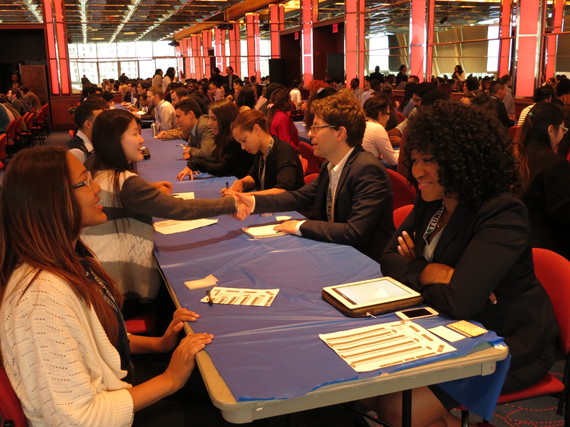Last week Bloomberg Philanthropies announced a new partnership to help ambitious low-income students get into and graduate from top colleges and universities. This historic investment in college access is the latest initiative to expand opportunities for low-income students, and is a big step forward.
I also know from hard experience that there is a next step.
So, if our goal is to enable these young people to take charge of their futures, we need to move the finish line: college graduation is not the final destination--launching a career is.
We need to integrate career education into our college access and success programs if we want to maximize the hundreds of millions of dollars we are investing in these students. College and career readiness cannot operate in separate, parallel dimensions, with career readiness as an implied outcome. Low-income students need interventions that are intensive, sustained and rigorous.
My organization, The Opportunity Network, equals the playing field for high-achieving, low-income high school and college students by creating access for them to career opportunities and professional networks while they are still in school. Our curriculum builds what we call "career fluency." In addition to preparing students for college, we teach them how to build and leverage professional relationships for academic and professional success. One hundred percent of our students graduate from college, and eighty five percent start career track jobs or graduate school within six months of college completion.
I've seen firsthand that education is essential, but it isn't enough.
Every student needs to learn how to build and leverage professional relationships. It's a complex proposition that begins with debunking the myth that networking involves schmoozing at Starbucks or at a campus career fair. The reality is that networking involves long-term and mutually beneficial relationships that require care and cultivation. The good news is that everybody has the ability to build a network. High school students from low-income communities can learn how to connect with teachers about their career interests, ask to be connected to somebody in the field or get an informational interview at a great company. But those conversations don't happen naturally--they require skills that need to be taught.
Since networks are a two-way street, every student needs to know what he or she can contribute. They need to be able to inventory and market their own assets, so that they can articulate the strengths, skills and experiences that make them valuable to others. It may include a special aptitude in math, graphic design experience or the scrappiness and enthusiasm necessary to complete a particularly challenging assignment. Teaching students how to do this gives them a crucial skill--creating opportunities for them to practice with professionals is invaluable.
Finally, every student needs to cultivate the know-how to navigate workplace and professional norms and behaviors. This know-how is called social capital, defined by British researcher David Halpern as the savvy to navigate a "cluster of norms, values and expectations shared by group members," which dictate how things work in a given community. The basic ground rules of professional etiquette can be the keys to unlocking social capital. Every student needs to know how to ace interviews, write professional emails, send thank-you notes and connect with co-workers.
We are sending unprecedented numbers of low-income students to college. Now let's give them the skills they need to parlay their educations into productive careers. What's at stake here is no less than the success of an entire generation of young people who face enormous obstacles, but have the potential to do great things. And isn't that what we all want?
Jessica Pliska is the Founder and CEO of The Opportunity Network
